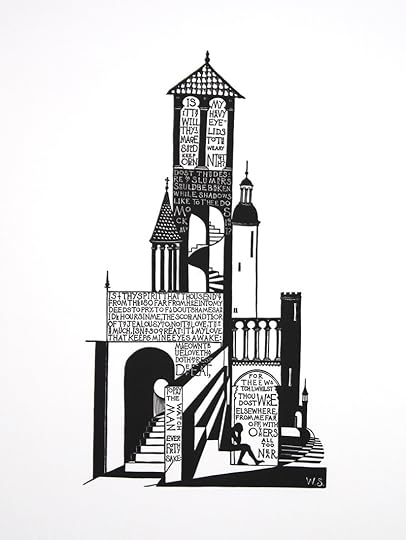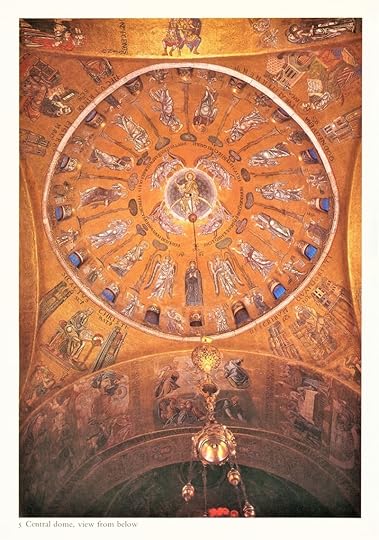Alan Jacobs's Blog, page 108
June 21, 2022
Sonnet 61 (2016). Linocut by Rosie Fairfax-Cholmeley
June 20, 2022
Lambeth 2022 and African Anglicanism – Covenant:
Whatever...
Lambeth 2022 and African Anglicanism – Covenant:
Whatever readers of this blog make of GAFCON, it constitutes a key segment of the Communion, too large to be ignored. While there is longstanding debate over whether or not the Lambeth Conference carries (or should carry) any binding authority, it has typically been taken as expressive of the mind of the Communion. The size of the Lambeth boycott, though, means that any decisions taken at Lambeth 2022 can be neither.
One possible olive branch lies, ironically, in the ongoing tragedy facing Nigerian Anglicans who have been harshly persecuted by Islamic militants for decades. Archbishop Welby has shown commendable concern for their plight. TEC has been far less vocal on the suffering of Nigerian Anglicans than the suffering, for example, of Palestinians (aside from protest at the abduction of the Chibok girls, which happened eight years ago). Were TEC and the wider Communion to give more solid support to persecuted Nigerian Anglicans, this would both be morally right and act as an olive branch to the Nigerian church. It would show that, though absent, Nigeria’s Anglicans remain of concern to those attending the Lambeth Conference.
Here in the U.S.A., there are no political points to be gained from compassion for Nigerians.
bodies and stones
In Breaking Bread with the Dead, I write about Donna Haraway:
There’s a fascinating early chapter in her book on human interaction with pigeons. Of course, that interaction has been conducted largely on human terms, and Haraway wants to create two-way streets where in the past these paths ran only from humans to everything else. How to get the pigeons to participate willingly in such a project is question without an obvious answer, but it’s question that Haraway feels we must ask, a because “staying with the trouble requires making oddkin; that is, we require each other in unexpected collaborations and combinations, in hot compost piles. We become-with each other or not at all.”
But here’s the complication: Who gets included in “each other”? Besides pigeons, I mean. Haraway says explicitly that her human kin are “antiracist, anticolonial, anticapitalist, proqueer feminists of every color and from every people,” and people who share her commitment to “Make Kin Not Babies.” “Pronatalism in all its powerful guises ought to be in question almost everywhere.”
I suspect that — to borrow a tripartite distinction from the psychiatrist and blogger Scott Alexander — most people who use that kind of language are fine with their ingroup (“antiracist, anticolonial, anticapitalist, proqueer feminists of every color and from every people”) and fine with the fargroup (pigeons), but the outgroup? The outgroup that lives in your city and votes in the same elections you do? Maybe not so much. Does the project of making kin extend to that couple down the street from you who have five kids, who attend a big-box evangelical church, and who voted for the wrong person in the last presidential election? And who, moreover, are a little more likely to talk back than pigeons are? (Even assuming that they might be interested in making kin with Donna Haraway, which, let’s face it, is equally unlikely. Presumably they too would be more comfortable with the pigeons.)
I thought about these issues as I read an excerpt from James Bridle’s new book:
A system of laws and protections developed by and for humans, that places human concerns and values at its core, can never fully incorporate the needs and desires of nonhumans. These judicial efforts fall into the same category of error as the mirror test and ape sign language: the attempt to understand and account for nonhuman selfhood through the lens of our own umwelt. The fundamental otherness of the more-than-human world cannot be enfolded into such human-centric systems, any more than we can discuss jurisprudence with an oak tree.
Legal representation, reckoning, and protection are founded upon human ideas of individuality and identity. They may prove useful when we take up the case of an individual chimp or elephant, or even a whole species, but their limits are clear when we apply them to a river, an ocean, or a forest. A plant has no “identity;” it is simply alive. The waters of the earth have no bounds. This is both ecology’s meaning and its lesson. We cannot split hairs, or rocks, or mycorrhizal roots and say: This thing here is granted personhood, and this thing not. Everything is hitched to everything else.
The enactment of a more-than-human politics calls explicitly for a politics beyond the individual, and beyond the nation-state. It calls for care, rather than legislation, to guide it.
As regular readers might expect, this call for care, this ecological perspective, resonates powerfully with me. (It also resonates with something I wrote about in another book: Simone Weil’s insistence that if we need a collective declaration of human rights, we also, and perhaps more desperately, need a declaration of human obligations.)
But it is curious to me that many people are willing to entertain this line of thought, are immensely sympathetic to this line of thought, who also affirm that “in relation to the mind the body has no rights”; and that a fetus in the womb is but an insignificant “clump of cells.” I don’t think you can consistently hold all those views. If you are willing to ask, “What do we owe the more-than-human world?” then, I think, you must also be willing to ask, “What do we owe the fetus in the womb? What do we owe our own bodies?” If you’re not asking these questions, then I fear that the other affirmations are empty rhetoric — a make-believe extension of agency to things you can then safely ignore.
June 19, 2022
From my essay ”You Are Not a Server”, on Dickensian chara...
From my essay ”You Are Not a Server”, on Dickensian characters:
To begin to cite examples is a dangerous thing. Once embarked on that journey, how would one end it? How could one mention the circumlocutions of Mr. Tite Barnacle without also mentioning the unctuousness of Uriah Heep, the commitment to Fact of Mr. Gradgrind, the endless compassion of Little Dorrit? Lo, I have already commenced. They are all infinitely memorable because they are all infinitely excessive; they are, as it were, nothing but surplus. They always remind us of the possibility of living at an outsize scale, of being simply more than anyone could expect, more than any reasonable person would ask for. If they seem mere caricatures, that may say something more about our crimped and confined moment than about them. They are a constant encouragement to expand rather than contract one’s options.
And that is why we need to read Dickens, now more than ever.
I published this a couple of months ago, but I don’t think I mentioned it here?
June 18, 2022
Mosaics of San Marco, Venice
less Tono, more Bungay
After writing my reflection on Tono-Bungay, I read Adam Roberts’s thoughts in his excellent literary biography of Wells — you can read almost the same account in this blog post — and was interested to see that Adam talked about all sorts of really important things that I had totally neglected. And yet I still think that my take on the book is valid and useful. It’s an indication of the book’s quality, I think, that such widely divergent readings can nevertheless capture real insights into its world.
One brief thought: Adam’s portrayal of Uncle Ponderevo as a cokehead — twitching, full of nervous energy, increasingly obese and yet simultaneously somehow withered — echoes Wells’s portrayal of modern London as hypertrophied, massively diseased. Uncle Ponderevo as London in microcosm; London as a macrocosmic Uncle Ponderevo. (Which is, by the way, a very Adam-Robertsian theme: see, e.g., Swiftly, the first novel of his I read, with its conceit that Gulliver’s Travels was reportage, not fiction.)
June 17, 2022
Mechanization and Monoculture, by me:Indeed, it seems to ...
Mechanization and Monoculture, by me:
Indeed, it seems to me that the one indisputable thing we can say about our current illiberalisms, of the left and the right (and this is the first of several theses I seek to promulgate here): All illiberalisms are intrinsically mechanistic. It is always their goal for mechanization to take command—as long as mechanization serves their ends. It does not seem to occur to them to ask, with Giedion, whether mechanization ever actually does serve human ends. Which leads us, I think, to a corollary thesis: Insofar as illiberalism is mechanistic, it is inhuman.
I have to admit that I like this essay — I think it’s a step forward in my attempts to think through the virtues of the plural world and the dangers of monism, to which so many are tempted. This essay is a step forward because it properly describes the end product of monism, which is a monoculture — I’m framing my analysis in ecological terms, which are, I believe, the right terms.
Natural ecology, media ecology, social ecology — that’s what I need to be thinking about, especially since all of these ecologies overlap to create a single planetary ecology in which Homo sapiens is the apex predator, but one that often preys on itself.
excerpt from my Sent folder: nodes
I try to make the best of the blogging environment, but I have always been fascinated by Jorn Barger’s early-web idea of what he called “single-layer web design” — it’s ironic that he is sometimes called the inventor of the weblog, because while he was one of the first to create a reverse-chronological list of links, that’s pretty much all they were, links, not developed ideas. Almost all of his Robot Wisdom site has disappeared since he abandoned the web some 20 years ago — I think the only thing left is this mirror of his James Joyce page.
But when I started making my actual home page, this is the model I had in mind: all the relevant information and necessary links on a single page, written in absolutely bare-bones HTML. And if I had the technical chops to do it, I’d ditch the blog and make my entire web presence a series of about five pages, each of which would be a kind of topical node, and each of which would continually in revision. Maybe one of them would be a Barger-style link-weblog, or I might just use micro.blog for that.
For example: like you, I am deeply attached to revising my posts — one recent case:
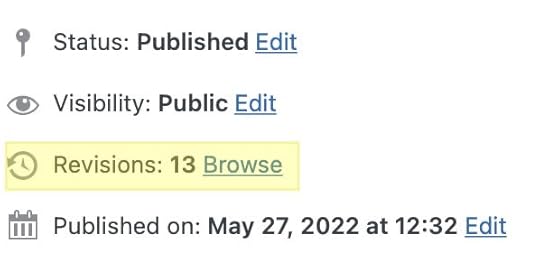
Thirteen revisions is on the low side for a longer post. Often I’m correcting spelling errors or tweaking the style, but sometimes I go in and use a tag to highlight; I might add an UPDATE, or, if I don’t like the way an update would make the post look, I’ll hop over to txt.fyi and write up an appendix and then link to it (I should probably make a page at ayjay.org, since txt.fyi could disappear at any time, but usually I’m too lazy). I also will sometimes help generate what I think of as internal dialogism — sorry for the fancy language — by using the tag.
But what I really want is the ability to make several pages that use all these tricks and more: highlights, details, footnotes, appendices, digital sticky notes, and (maybe above all) versioning — the ability for readers to diff, as it were.
Four or five topical nodes, ever-expanding, linking out and back, commenting on itself, inviting commentary from others, etc. etc. THAT would be the coolest thing ever, to me. In fact, I might start experimenting with a basic page structure that would allow a first approximation of this vision….
June 16, 2022
Learning a lot from this FIFA map. For instance, Denver i...

Learning a lot from this FIFA map. For instance, Denver is now where Bozeman used to be; Dallas where Kansas City used to be; Kansas City where Des Moines used to be; Cincinnati where Toledo used to be; Nashville where Louisville used to be; and Atlanta where Nashville used to be. Gotta remember this for upcoming drives.
P.S. I ended up finally reading Tono-Bungay because, at a...
P.S. I ended up finally reading Tono-Bungay because, at a bookstore in Austin, I found a beautiful old Heritage Press edition of the novel for eight bucks! Perfect condition first edition from 1960.
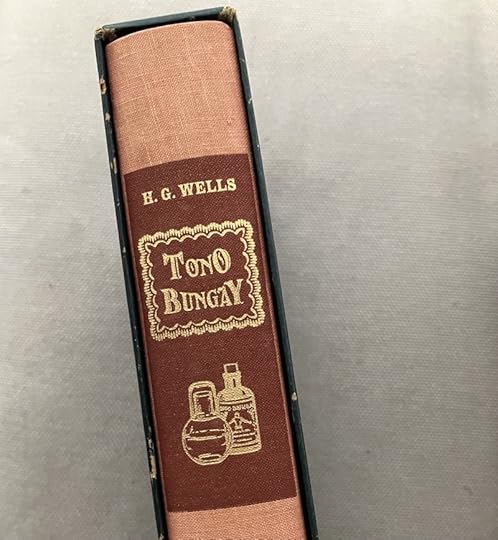
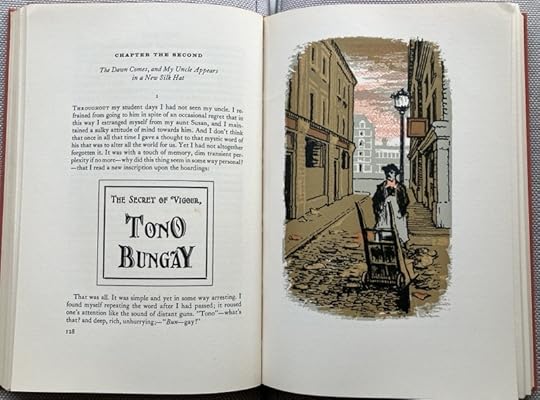
It even included the Heritage Press newsletter that accompanied its books:
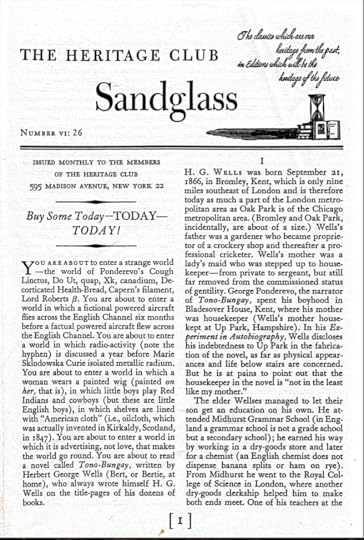
A delightful way to read an outstanding novel.
Alan Jacobs's Blog
- Alan Jacobs's profile
- 529 followers


